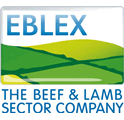|
12/08/06
All the indications are that the market for English lamb will
remain strong for at least the remainder of 2006 - providing
the normal autumn and winter marketing pattern can be maintained
in the light of the cold spring and summer drought.
This encouraging forecast is from the English Beef and Lamb Executive
(EBLEX) in its latest quarterly assessment of past, present and
future sheepmeat supply and demand.
Behind the fairly disappointing prices of 2005 were substantial
increases in the annual GB slaughterings of both lambs and cull
ewes – up about 7% (870,000 lambs) and 13% (252,000 ewes)
respectively. At the same time, an 18% increase in chilled lamb
imports in the second half of the year added to the supply problem
with only a strong export performance helping to maintain prices.
While increased domestic supplies and a higher level of chilled
imports through January and February this year kept lamb prices
disappointingly down on the previous year, a strong domestic retail
market and higher export demand resulting from the Continental
bird flu scare led to a recovery from March. Since then average
weekly prime lamb prices have continued to be between 20p/kg and
40p/kg higher than last year.
There is scope to maintain such price differentials. This is based
on the expectation that domestic and export demand will remain
strong, along with the effects of the lower ewe flock recorded
in the December 2005 census and slightly lower lambing rates of
the past spring restricting supplies. This will be especially true
if the hot dry summer leads to lambs being finished at lighter
weights.
Cold spring weather checked early lamb growth and the dry weather
now poses a possibility of delayed marketing which could lead to
heavier marketing of lambs above the normal profile in late autumn/early
winter which would put downward pressure on prices.
EBLEX stresses the key to maintaining prices comfortably above
2005 levels for the remainder of the year is to avoid a late glut
and ensure a steady flow of lambs from this autumn.
To achieve this producers are advised to monitor lamb condition
and growth rates carefully and consider additional supplementary
feeding to finish as many as possible ahead of the autumn peak
in marketing. This will also reduce any excessive carryover of
old season lambs onto the spring market which could otherwise undermine
early 2007 prices.
Such changes should, however, only be made by producers following
proper assessments of their likely costs as well as benefits, based
on realistic price assumptions and growth targets.
Up-to-date guidance on finishing and marketing lambs for the best
returns can be obtained from EBLEX Sheep Better Returns Programme
manuals and Action for Profit factsheets available free of charge
to English levy payers at www.eblex.org.uk.
 Buckleys take Skipton Suffolks show championship Buckleys take Skipton Suffolks show championship
 Hampshire Downs leads SRS Scheme Hampshire Downs leads SRS Scheme
 Act Now to Avoid Continued Double Tagging Risk Act Now to Avoid Continued Double Tagging Risk
|



